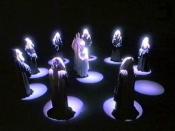1
Beci
Joris Beci
Ms. Reed
English 10 Rm 323
May 5th, 2014
The Deceptive Nature of Atonement
In Atonement, Ian McEwan depicts an unusual view compared to the typical, emblematic path of forgiveness on the imponderable atonement. Although the majority of the novel is about Briony's journey towards atonement, which she doesn't fulfill properly the way she wanted to, according to the fact that her sister and Robbie don't make it to be together. McEwan alludes to people, especially Briony, try and strive to make up for the wrong they do, but its up to her to reach that inner state of peace within themselves to achieve atonement. Briony must first forgive herself, as her first step to atonement. Briony's tale emphasizes the elusive nature of atonement throughout her guilty conscience due to the crime she had committed, her feelings of guilt, and her attempt to achieve atonement through Robbie and Cecilia.
Briony realizes that she has to attempt to reach atonement after the destruction and transformation of an innocent man when she misinterprets her idealistic truth with the undeniable reality. In the beginning of the novel, Briony feels a hint of guilt, as she is opening and reading Robbie's letter to Cecilia. Briony knew "It was wrong to open other people's letters," but, to her, it was "it was essential, for her to know everything."(106). Even though she's conscious of her wrongdoing, she aspiration to control all situations of life, as if she were the author of the novel, leads her to feel that her actions are not only justified, but right. When Briony is determined that Robbie was guilty of raping Lola, she doesn't look or want any evidence to prove her wrong. Her logic further justified that, "Everything connected. It was her own discovery." As...


